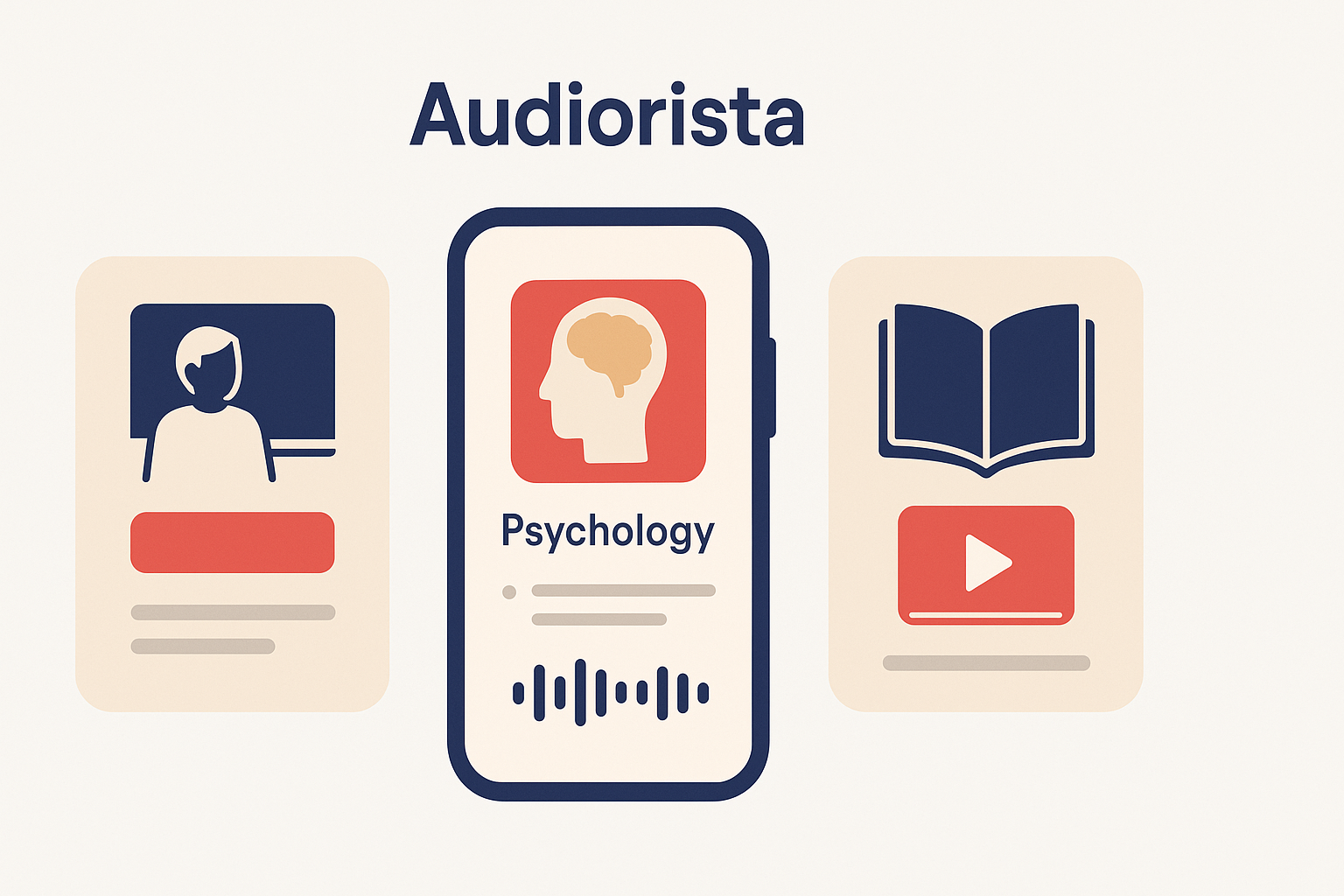Best Educational Psychology & Pedagogy Apps with Audiorista

Educators and students can benefit from digital pedagogy apps that centralize psychology and educational content in accessible, multimedia formats. In practice, many teaching and learning resources remain fragmented or difficult to access, creating barriers for effective study and professional development. This is why educational psychology apps, pedagogy mobile apps, and digital pedagogy platforms have become essential tools in modern classrooms and training environments. They allow users to access structured, portable, and interactive content that improves comprehension and learning outcomes.
Audiorista offers an ideal solution through its no-code platform—enabling schools, educators, and psychology content creators to build custom, branded apps that combine video, audio, and text delivery. This makes it easier for teachers to distribute content, for students to engage with study materials, and for institutions to manage training libraries. In this guide, we’ll define how learning psychology tools and pedagogy apps can transform education, explore their use cases for students, teachers, and institutions, and demonstrate how Audiorista can centralize and publish educational content in one unified experience.
Defining educational psychology apps
An educational psychology app is a digital platform designed to support the study and practice of educational psychology. Its role is to help students and educators better understand how people learn, retain information, and engage with teaching materials. These apps act as structured learning environments, offering learners access to resources that explain cognitive processes, motivation, and applied teaching strategies.
For undergraduate psychology students, such apps provide a way to consolidate lessons, recorded lectures, and written resources in one place for more efficient study. For teacher training programs, they offer tools that make psychological principles more practical and relevant in the classroom. By presenting digital resources in multiple formats—audio lectures, video case studies, and text-based articles—educational psychology apps connect theory to practice.
Through Audiorista, educators and training institutions can bundle these resources into one accessible application. This centralization gives learners a structured environment where course content, supplemental study materials, and reference texts stay together in an always-available, mobile-friendly app.
Pedagogy and learning tools in practice
For teachers, a pedagogy mobile app provides vital resources for lesson planning, classroom management, and ongoing professional learning. Pedagogy encompasses both the art and science of teaching, and having reliable, mobile-first access to pedagogical strategies allows educators to refine their methods at any point in their career.
The benefits of a pedagogy app include organized access to lesson structures, continuous updates on teaching methodologies, and the ability to reference new strategies in real time. Since professional development doesn’t end in teacher training programs, digital pedagogy tools become essential for lifelong education and self-improvement.
With Audiorista’s educator-focused features, teachers can publish and distribute their own pedagogy content—from guides and recorded workshops to collaborative staff training materials—in a single app. This ensures teaching staff across an institution or program can easily access and apply consistent learning resources. Educators aiming to take control of their professional growth can also create a pedagogy mobile app with Audiorista for Educators and structure content specifically for staff development and teaching practice.
Students benefit significantly from psychology learning platforms that deliver educational content through apps. These learning psychology tools make it possible to study at an individual pace, revisit content as needed, and deepen comprehension with multimedia explanations.
App-based platforms support multiple approaches to learning, such as self-paced access to recorded lectures, reviewing case studies, or exploring multimedia storytelling resources that illustrate cognitive concepts. These flexible tools enable students to approach psychology content in ways that suit their learning preferences.
Audiorista enhances these benefits by allowing educators to deliver diverse formats: text-based study notes for quick review, audio lectures for on-the-go listening, and video tutorials or experiments that provide more immersive learning. This variety of formats improves retention and makes complex concepts more approachable for a wider range of learners.
Institutions and training organizations require scalable ways to distribute pedagogy content across faculty members, students, and professional development programs. A digital pedagogy platform can meet these needs by acting as a central hub for training modules, case-based learning, or specialized academic content.
Common use cases include faculty development libraries that bring together recorded workshops, student training modules on cognitive science, and competency-based case-study materials. By offering this content through a digital platform, institutions can align teaching approaches and expand access across multiple departments or campuses.
With Audiorista’s no-code e-learning app builder, educational organizations can create branded apps that place all these resources in one structured application. This secures institutional ownership of critical learning assets and ensures that staff and students can access materials anytime, anywhere. Organizations looking to deploy at institutional scale can learn more about building an education content app with Audiorista for Coaches & Trainers and explore dedicated features built for training use cases.
Advantages of integrated platforms
Bringing psychology and pedagogy resources into centralized educational apps delivers measurable benefits for both teaching and learning. By bringing diverse formats together, apps eliminate the fragmentation that often holds back digital education. Whether users need quick access to lecture recordings, staff training resources, or multimedia learning modules, the right app provides it in one consistent, branded environment.
Key advantages of pedagogy and psychology apps include:
- Centralized access: Educators and students avoid scattered files and online silos by accessing one organized resource hub for multimedia content.
- Increased engagement: Multimedia delivery—from podcasts to videos—encourages deeper participation and caters to different learning styles.
- Smoother curriculum delivery: Course content aligns seamlessly with digital-first expectations, supporting blended and distance education.
Unlike many traditional platforms that require advanced technical knowledge, Audiorista gives educators total control over their apps without requiring coding skills. This lowers barriers to digital publishing and ensures teachers, trainers, and organizations can focus on educational value rather than platform complexity.
Start building your own branded psychology or pedagogy learning app today—launch your content with Audiorista’s no-code platform.


